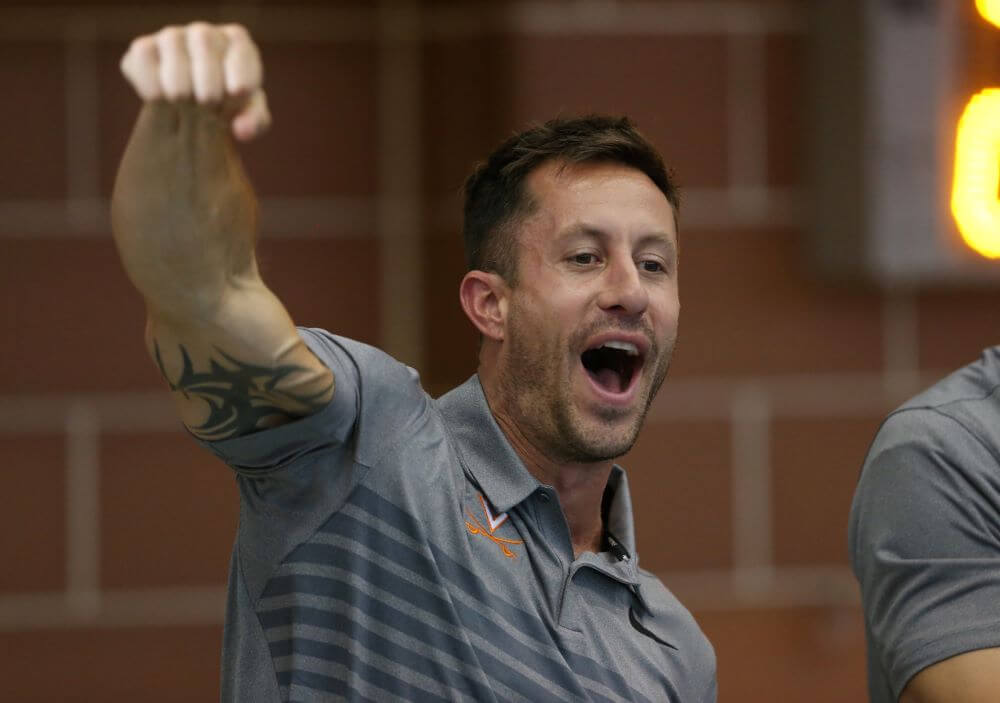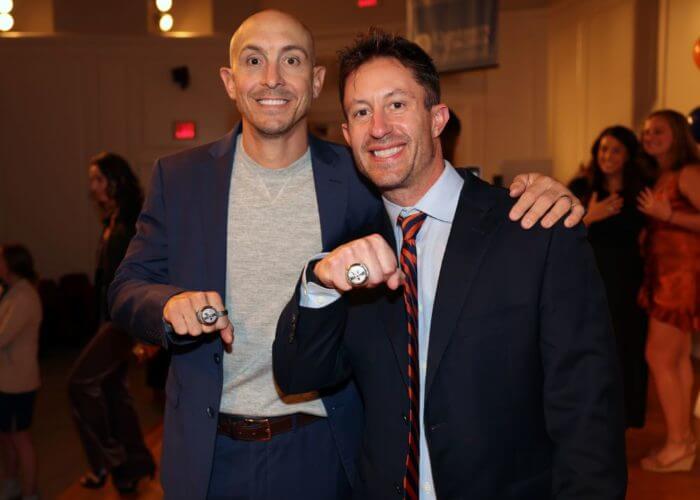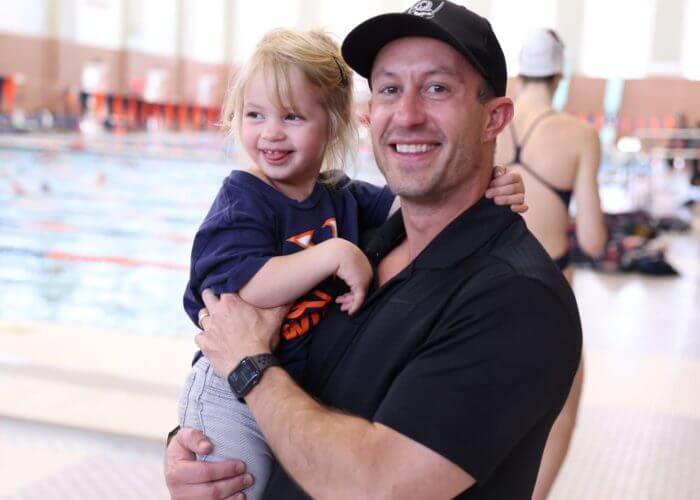Q&A With Tyler Fenwick, Associate Head Coach at Three-Time NCAA Champion Virginia

Q&A With Tyler Fenwick, Associate Head Coach at Three-Time NCAA Champion Virginia
A Germantown Academy product, Tyler Fenwick has turned his passion for people and competition into a profession devoted to improving the lives and aquatic prowess of some of the country’s best swimmers.
Tyler Fenwick
Associate Head Coach
University of Virginia
Charlottesville, Virginia
• College of William & Mary, B.A., English, 2004; University of Tennessee, M.S., sports management, 2009
• Associate head coach, University of Virginia, 2017-present
• Associate head coach, University of Tennessee, 2012-17; assistant coach, 2007-09
• Coach, men’s Mission Viejo national team, 2009-12
• Assistant coach, Germantown Academy, 2004-07
• Head coach, World University Games, 2015, 2017
• Head coach, UANA Pan American Championships, 2017, 2018
• Member, U.S. national team coaches list, 2011-present
• Has coached 9 U.S. Olympians, 25 U.S. national team members, 12 World Championship members and 10 U.S. national champions
• Has coached a male and female CSCAA All-America swimmer in every event and had at least one swimmer compete in every event at Olympic Trials
• Member of USA Swimming Steering Committee
• ASCA Level 5 coach
Q. SWIMMING WORLD: At one time, you were Germantown Academy’s fastest ninth-grade breaststroker. As a 10th-grader, you opted for basketball. Why?
A. COACH TYLER FENWICK: I was a kid in Philly inspired by Allen Iverson. I had a heck of a jump hook. After a few month’s hiatus, I came right back to swimming because I loved Coach Dick Shoulberg, and I had many friends on the team. I was 15 and needed a little time to figure out who I was and what mattered most to me. I had a nine-second drop in the 100 breaststroke over the next two years, which allowed me to swim at William & Mary.
SW: You went to law school. Why?
TF: I did it for my dad and lasted a year. When I graduated from W&M, I didn’t know exactly what I wanted to do. I went back and coached for Shoulberg for three years. He had some pretty special teams that won multiple national high school and prep championships. I would coach morning practice, paralegal in the city at a friend’s insurance defense firm, head back for afternoon practice and then coach age group and Masters at night. Deep down, I knew I wanted to be a coach. I love swimming, teaching and the chase of best times and championships.

Photo Courtesy: UVA
SW: What inspired you to become a swim coach?
TF: I am a swim coach because of Dick Shoulberg. He is my mentor, my father and friend. I love that man and admire him more than he’ll ever know. He used swimming as a conduit to teach invaluable lessons and change the trajectory of so many lives. I wanted to make an impact on the lives of others the way he had impacted me. Also, coaching came naturally for me. I’m a people person, have high energy, love to learn and teach. I’m highly competitive. Those qualities make it a great fit.
SW: At Germantown, you were exposed to coaching open water. What was “open water Wednesday” like with Arthur Frayler?
TF: Intense! Arthur was a beast—ultimately, a four-time NCAA All-American and Pan Am gold medalist. I coached him as an age grouper, and it was such a pleasure to watch him grow and mature in the sport. A lot of what I learned from those “open water Wednesdays” I brought to Mission Viejo. We would go broken 10,000 long course workouts twice a week. We re-created the “Animal Lane.” Two 16-year-old boys made the U.S. national team out of that lane.
SW: At MVN with Bill Rose, you found a love for open water. How so?
TF: Water is engrained in the culture of Southern California. Kids are in the ocean from the time they’re babies. The junior guard program keeps them active in the water. Lots of the top athletes aren’t playing football or basketball—they are swimming and playing water polo. Mission Viejo does a great job blending pool swimming and open water. We would do beach workouts where our national team kids would pair with an 8-and-under group, teach them to run out into the water, swim past the breakers, stay in packs and lines, and how to draft and pass people.
Open water was a way of life. It was hard not to get caught up in the beauty of it. I saw it as a great way to give athletes their first taste of the national and national junior teams with USA Swimming. I wanted them to be able to make those teams and have a chance to travel throughout the country and world to race the best.
SW: What impact did Fran Crippen have on your life?
TF: Fran was one of my best friends. He had an amazing perspective, persona and passion for life. He was the most intense worker in the pool and the life of the party. He had a tremendous sense of loyalty to his family, friends and teammates. Fran had a knack for being able to walk into a room and have everyone laughing within seconds. I think about him every day.
SW: Some very different mentors share similar characteristics. Such as?
TF: I’ve been beyond blessed to have worked alongside coaches Shoulberg, Rose, (Matt) Kredich and (Todd) DeSorbo. Each is a fantastic leader and coach. All four treat others well. They go the extra mile to let their athletes, coaches and anyone in their lives know that they care tremendously. They have extremely high standards and their lives revolve around serving others. They are never looking to be good; they always have their eye on what is and what can be great. There’s not a lot of compromise from any of them. Another common thread is that they’re always on a mission. They’re masters at setting goals, creating plans to get there and motivating others to join them.
As valuable as a mentor can be, I believe our athletes are the best teachers for any coach looking to evolve and improve. That’s been true for me. Athletes are the ones who provide the best feedback as to what is working, what isn’t and what needs to change. There are peaks and valleys to every season. One can learn a lot from the adversity and success you share with the athletes around you.

Photo Courtesy: Tyler Fenwick
SW: How has your coaching philosophy evolved?
TF: I’ve mellowed and take a lot more in stride. A part of that comes from being a husband and father; also from age and experience. I was “hell on wheels” at the beginning of my career. The swimmers in front of me were going to work hard and swim fast whether they wanted to or not. Many did, but many also decided that in that environment, swimming wasn’t for them. I regret that. I’m more intentional now. I’m more focused on building relationships and providing a positive experience that swimmers look back on fondly. I want to be invited to my swimmers’ weddings. I think that’s a good gauge of whether a coach is doing a good job!
SW: What in coaching are you doing differently now?
TF: Since arriving in Virginia, I’ve added much more variety. For a long time, it was distance free. In the last six years, I’ve coached 100s and 200s of strokes, IM, middle distance and distance free. It’s been a great change of pace, and it allows me to work with virtually every swimmer at least once a week.
SW: Lately, why have you chosen college over club coaching?
TF: I’ve had some amazing opportunities to return to club swimming. I’m just having too much fun with Todd and our staff at Virginia to leave. We have a great group of coaches and a rare synergy. We’re also winning right now, which has been a blast. I’m having the time of my life in Charlottesville.
SW: What are your professional goals these days?
TF: They are tied to our team goals. I’m focused on being the best version of myself while driving the evolution and success of Virginia. I’m continually trying to find ways to make myself more knowledgeable and skilled to add value to our staff and team.
I did a lot over COVID-19 when we were stuck at home. I enrolled in a professional leadership program through Oxford University’s Said Business School. I also taught myself how to make graphics and videos, and being able to produce (them) on demand has been very beneficial. I run our social media accounts. I also try to help take as much off Todd’s plate as possible, whether it’s mundane paperwork, working with alumni and administration or helping plan a banquet. I do my best to anticipate what needs to be done, and do it.
SW: What would you do next if you left coaching?
TF: I’d stay in the sport or sports if I ever left coaching. I enjoy the process of helping to build and develop competitive organizations. Marketing, fund raising, thinking outside the box and problem solving are areas that move the needle for me. I could see sliding to administration at the college level, running a club team as an executive or representing professional swimmers and helping them build their brand and to find exciting opportunities to market themselves outside of the pool.
SW: What would you be doing if you never went into coaching?
TF: I am a baseball nut. I watch it every night during the summer. My daughters have baseball names! I was an English major at William & Mary. I’d probably have tied the two together and become a baseball writer.
SW: What’s being part of UVA’s energetic and competitive swim staff like?
TF: Life at UVA is not dull. Whether it’s 5 a.m. or 5 p.m., we rock! Our staff has an incredible bond. We’re at a point where we can look at each other and know exactly what someone is thinking. You don’t play swimming. It’s a grind for everyone involved. It’s extraordinary to be part of something so electric. The student-athletes we work with are exceptional people. It’s a pleasure to bring everything we have each day to make their experience one that they’ll never forget.
SW: How do you get your athletes to be the best version of themselves?
TF: Each person is unique. They have strengths, weaknesses and a particular perspective on life. Our goal is to guide and encourage everyone to set the bar high, dream big and work to be the best they can be. The team has bought into that mindset. They take pride in how they approach what they do in the pool and outside it.
SW: In what way are weights and DPS emphasized in training at Virginia?
TF: We’re big on both. We have stroke and kick count rules for virtually every set we do. It teaches efficiency and discipline. It shows with our freshmen after a few months. They get farther off their walls, swim bigger and take fewer strokes while getting faster.
SW: Give an example of swimmers taking ownership of a hard set.
TF: Our coaching staff works hard to be engaged and keep the energy up at workouts, but we’re at our best when the team creates the environment. Blaire (Bachman) Anderson and I run a “Red Set” each week. It’s a long threshold, so it’s typically one of the most challenging workouts we throw at them. It’s cool to see the group take control of these sets by getting vocal, cheering each other on, challenging teammates and swimming fast. It’s easy to stay quiet in the middle of a set like this. The exceptional happens when you stop thinking about yourself and start to inspire and be inspired by those around you.
SW: What’s with your sports memorabilia collection? Any favorite pieces?
TF: I’m a huge sports fan. I’ve been collecting autographed memorabilia since I was a kid. I have a little baseball card business on the side, too. I’ve met a lot of Hall of Famers and legends over the years: DiMaggio, Mays, Mantle, Ted Williams, Hank Aaron, Koufax. I have some very cool stuff.
One of my favorites is an autographed Kobe Bryant basketball from when he was in high school. At the time, he was at Lower Merion and came to Germantown Academy to play. I got to the game early with a Sharpie and basketball. I sat right behind the Lower Merion bench. A few minutes after I arrived, a couple sat beside me. They asked if the ball was for Kobe. I told them it was, and they told me they were Kobe’s parents. I have a ball signed, “To Tyler, From Kobe Bryant #33” on a shelf in my basement. Pretty AWESOME!
SW: What’s the story behind the Miami (OH) warm-up prank?
TF: I may have been to an Invite at Miami of Ohio in 2001. I may or may not have decided it would be funny to squeeze a chocolate PowerBar and toss it in the warm-up pool. At that point, I may or may not have dived in with a crowd watching, grabbed the bar, said, “I got it” to the gasps of the onlookers, and then took a bite. Man, the aquatics director was mad! They may or may not have cleared the pool with lifeguards attempting to fish the object out.
* * *
Michael J. Stott is an ASCA Level 5 coach, golf and swimming writer. His critically acclaimed coming-of-age golf novel, “Too Much Loft,” is in its second printing, and is available from store.Bookbaby.com, Amazon, B&N and distributors worldwide.




Great Q&A